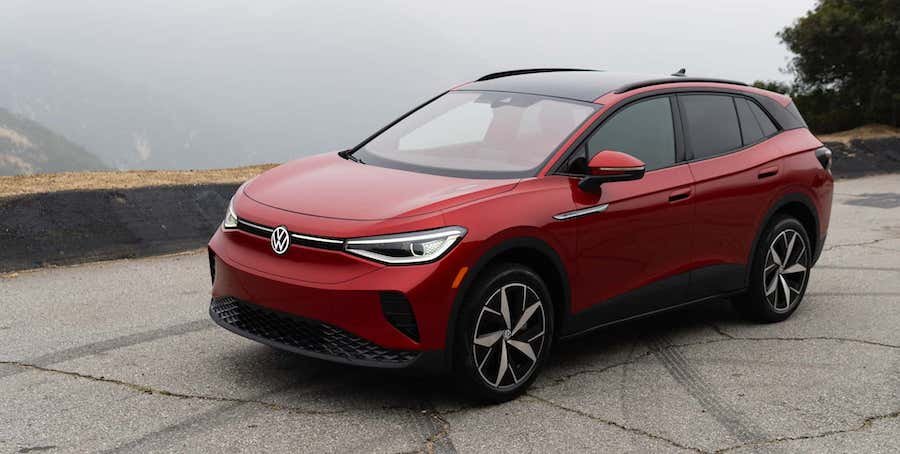Volkswagen Adds ChatGPT Voice Assistant To ID.4, Other Models

Most American car buyers will probably tell you that new vehicles need more actual, physical buttons, not bigger and better touchscreens. But the fact is that cars are getting more complicated, with more complex features and functions on offer than ever before. The automakers can't possibly bake each of those features into one button (or they don't care to try) so increasingly, they're turning to voice-based controls to help drivers navigate the many things that modern vehicles can do.
Volkswagen is no stranger to the AI-powered voice assistant game. But right now in Europe, and soon enough in the U.S., the voice assistant in those cars has backup from the headline-making natural language chatbot assistant ChatGPT.
ChatGPT is now available on all vehicles in the electric ID family in Europe, VW officials said last week. It's also being rolled out on the new Golf, Tiguan and Passat in European markets. For the U.S., a Volkswagen of America spokesperson told InsideEVs that the functionality will be on "most" model year 2025 vehicles, which are not on sale here yet.
Many of VW's current vehicles, including the electric ID.4, carry an AI-powered voice assistant called IDA. I've been using it on the 2024 Volkswagen ID.4 Pro S I've been testing for the past week. IDA is pretty good overall. It can answer general questions, operate vehicle functions like climate control and window defrosters, and plan EV charging along the route to your destination. But I'd say that Google-powered systems I've tried on EVs from Volvo and General Motors tend to perform better when you ask them complicated questions or request to navigate to places with specific names, like restaurants.
Perhaps ChatGPT will change that for Volkswagen. VW says it's not in play all the time but will serve as a backup whenever IDA is unable to answer.
"Only if a query cannot be answered by the Volkswagen system is it forwarded anonymously to ChatGPT; the answer is then provided in the familiar Volkswagen voice," VW officials said in a news release.
"With the introduction of ChatGPT, the possibilities have expanded significantly: for example, AI can provide information on tourist attractions, report on past football tournaments or help solve math problems," the release continued. "All of this works intuitively: the driver simply talks to the assistant in natural language, and there is no need for them to take their eyes off the road."
And "eyes on the road" is a big part of the appeal here. As cars have gained all these sometimes convoluted software-based functions—in-car apps, video meetings, streaming music integration and countless new drive settings—it's tougher than ever to make sure drivers pay attention behind the wheel as well. Volkswagen has received withering criticism for its ID cars in particular, which dump nearly all physical buttons for screen-based controls and haptic switches. (I'll have more to say about these in an upcoming ID.4 review, but let's just say they're as annoying as they've ever been.)
Instead, automakers would rather you hit a button to activate the voice controls or wake the system with a special phrase and then just tell the car what you need it to do. Generally, I'm a fan of these systems, provided they work well; some are certainly better than others. ChatGPT is increasingly becoming one such go-to voice system for new cars, although VW it's breaking new ground by bringing the software to more accessibly priced vehicles. "Volkswagen is one of the first high-volume manufacturers to bring ChatGPT to its vehicles through collaboration with technology partner Cerence," the automaker said.
At the same time, OpenAI's ChatGPT—along with most other large language model AI systems—is drawing plenty of controversy. As Wall Street salivates over an "AI boom" that has skyrocketed the valuations of companies like chipmaker Nvidia, many users report that AI-powered text prompts and search results have been ridden with errors. While the technology is no doubt maturing, it has struggled thus far to differentiate between factual content and, say, satirical articles from The Onion or wildly erroneous social media posts. Many content creators, creatives and journalists also fear that the evolution and proliferation of generative AI could threaten their livelihoods—or even the very premise of human artistic endeavors.
But hey, that's a lot to put on the Volkswagen ID.4, which is probably just going to be asked if it can find a restaurant with decent gluten-free options near a charging station. With any luck, VW's rollout of ChatGPT will be not only robust and useful, but accurate as well.
Related News


